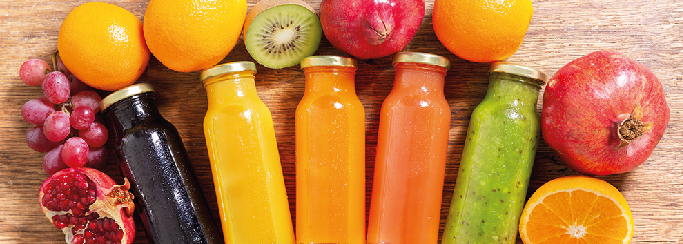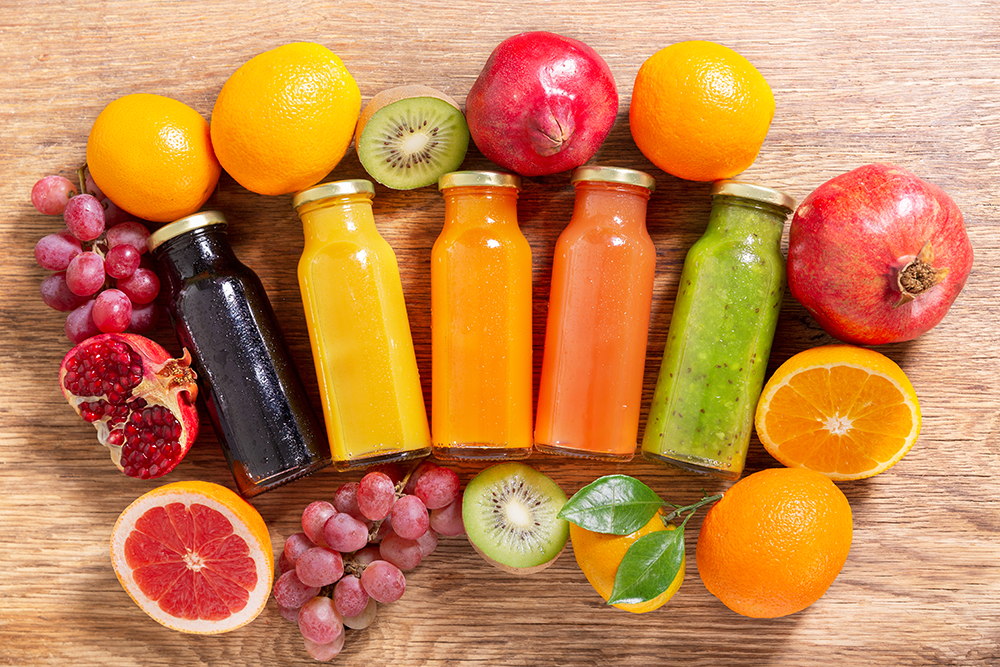What microorganisms are behind the spoilage of fruit beverages?
What do we know about Alicyclobacillus?
Since 1980, it has been known that the spoilage of fruit and vegetable juices is caused by spore-forming thermoacidophilic bacteria belonging to the Alicyclobacterium genus. This genus comprises Gram-positive aerobic bacteria that can thrive at pH levels ranging from 3 to 5.5 and withstand temperatures between 20 to 70°C. Although they do not necessitate a strictly thermophilic or acidic environment to survive, they have even been found naturally in soil.
Their spores are resistant to pasteurization, and under appropriate conditions due to their acidophilic nature, they can germinate and multiply in processed products, leading to the production of harmful compounds that cause product deterioration. Contamination issues typically arise a few days following packaging.
Commonly linked foods are fresh products like cucumbers, tomatoes, sprouts, as well as fruits such as mangoes and melons.
Detected Salmonella serotypes are often associated primarily with contaminations of animal or human origin. While S. Typhimurium and S. Enteriditis are the most clinically relevant, the distribution of Salmonella serotypes varies by region. Therefore, genetic identification of strains is crucial for surveillance and tracing the original sources of contamination, essential in cases of salmonellosis outbreaks.
Despite the quality of irrigation sources depending on the effectiveness of treatments for disinfecting bacteria, viruses, and parasites, cases have been detected where resistant Salmonella strains prevail, exacerbating the existing problem.
Infamous spoilage

In the fruit and vegetable processing industry, spoilage is common. This term simply refers to product deterioration caused by Alicyclobacillus. Its presence in packaged fruit products is known to induce alterations in sensory properties like taste and odor, including sediment formation, discoloration, or cloudiness. Consumer complaints often serve as the only indication to companies of a problem, as the lack of natural gas production complicates spoilage detection. Flavors produced by Alicyclobacillus have been described as medicinal, antiseptic, or phenolic. These properties are attributed to the formation of compounds like guaiacol and halogenated phenols, which are detectable at very low concentrations and can compromise the sensory quality of the product.
Alicyclobacillus acidoterrestris stands out as the primarily responsible species for spoilage incidents in the industry, although other species such as A. acidiphilus, A. pomorum, A. hesperidum, A. herbarius, A. cycloheptanicus, and A. acidocaldarius have also been linked. This is due to their ability to generate contaminating compounds or being found in deteriorated products.
Despite Alicyclobacillus posing an economic concern for the fruit processing industry, it is crucial to note that consuming products containing this microorganism does not pose a health risk, as it is not considered pathogenic.
How can Alicyclobacillus be identified in the food industry?
Given the challenge of controlling this microorganism in fruit processing and the economic impact of the issues it can generate, the International Fruit and Vegetable Juice Association (IFU) introduced Method No. 12 in 2019 for the detection and quantification of spore-forming thermoacidophilic bacteria, particularly Alicyclobacillus spp., and the detection of other bacteria with similar properties capable of producing guaiacol. This procedure is applicable to:
Fruit juices and related products, along with their ingredients intended for human consumption.
Environmental samples, including process water in areas of production and handling of fruit juices and related products.
The method outlines both the quantitative and qualitative analysis of the bacteria. For quantification, the membrane filtration technique is used for filterable products or a specific product volume in non-filterable cases. As for qualitative analysis, it begins with an enriched sample to determine the presence or absence of the microorganism.
Following a thermal treatment (at 80°C for 10 minutes) to stimulate spore germination, the sample or its initial dilution is cultivated in BAT broth and agar, incubated at 45°C for 3-5 days, as per IFU guidelines. This detailed procedure serves as a valuable tool for the effective detection of Alicyclobacillus and other relevant bacteria in the food industry.
Control and Prevention of Alicyclobacillus
To prevent the deterioration caused by Alicyclobacillus, it is essential for affected industries to implement control and prevention practices at critical processing points. Key measures include:
- Quality control of raw materials: Conducting microbiological analyses on fruits and other ingredients before processing to ensure their safety and absence of contamination.
- Good hygiene practices: Maintaining strict cleanliness and proper disinfection standards in production facilities, including adequate sanitation of equipment and surfaces.
- Appropriate pasteurization processes: Ensuring that pasteurization processes are sufficiently rigorous to eliminate any potential bacterial contamination.
- Proper packaging: Verifying that packaging is clean and properly sterilized before use with the product in question.
- Optimal storage: Storing products under optimal conditions, avoiding high temperatures that could promote the germination of Alicyclobacillus spores.
These comprehensive control and prevention strategies are essential to preserve the quality and safety of food products, ensuring they are free from unwanted contamination caused by Alicyclobacillus and other harmful microorganisms.
The presence of Alicyclobacillus can lead to severe deterioration in the organoleptic characteristics of the product, which can negatively impact consumer perception and acceptance. By maintaining strict hygiene practices and appropriate quality control measures, companies can minimize the risks associated with Alicyclobacillus presence and deliver high-quality products.



